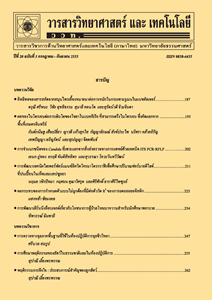การตรวจวินิจฉัยการติดเชื้อในระบบทางเดินปัสสาวะทางห้องปฏิบัติการ
Main Article Content
บทคัดย่อ
บทคัดย่อ
การติดเชื้อในระบบทางเดินปัสสาวะ (urinary tract infection) เป็นภาวะติดเชื้อจุลชีพหนึ่งที่พบได้บ่อย จุลชีพก่อโรคส่วนใหญ่เป็นแบคทีเรียกลุ่ม Enterobacteriaceae ที่พบได้ในลำไส้ โดยเฉพาะ Escherichia coli ซึ่งมีแนวโน้มการดื้อต่อยาปฏิชีวนะมากขึ้น การวินิจฉัยการติดเชื้อในระบบทางเดินปัสสาวะโดยอาศัยอาการทางคลินิกเพียงอย่างเดียวอาจมีความผิดพลาด ส่งผลให้มีการรักษาด้วยยาปฏิชีวนะโดยไม่จำเป็นและก่อให้เกิดปัญหาการดื้อยาของแบคทีเรียตามมา การตรวจการติดเชื้อในระบบทางเดินปัสสาวะทางห้องปฏิบัติการโดยอาศัยกระบวนการทางจุลทรรศน์ศาสตร์และการเพาะเชื้อรวมทั้งการทดสอบความไวต่อสารต้านจุลชีพ (urine culture and antimicrobial susceptibility test) สามารถเพิ่มความไวและความจำเพาะในการวินิจฉัยการติดเชื้อดังกล่าวได้ ทำให้การวางแผนการรักษาของแพทย์เป็นไปอย่างมีประสิทธิภาพ
คำสำคัญ : การติดเชื้อในระบบทางเดินปัสสาวะ; การตรวจทางห้องปฏิบัติการ
Abstract
Urinary tract infection (UTI) is the most common infection. Most causative pathogens are member of Enterobacteriaceae found in gastrointestinal tract, especially Escherichia coli. Furthermore, there is an increasing of antimicrobial resistance among these pathogens. The diagnosis of UTI solely based on clinical symptom may be uncorrected, leading to inappropriate antimicrobial treatment and inducing antimicrobial resistance of bacteria. Including the laboratory diagnosis such as microscopic examination, urine culture and antimicrobial susceptibility test of probable pathogen could enhance sensitivity and specificity of UTI diagnosis and efficiency of treatment.
Keywords: urinary tract infection; laboratory diagnosis

